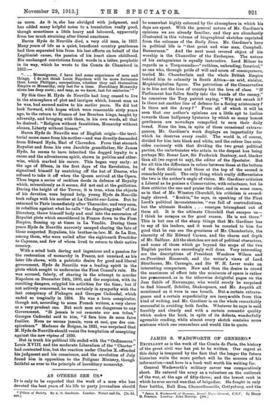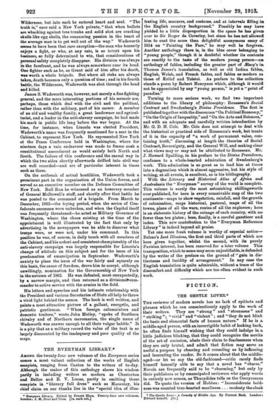JAMES S. WADSWORTH OF GENESE0.*
EXCELLENT as is the work of the Comte de Paris, the history of the great civil war has yet to be written. Our regret at this delay is tempered by the fact that the longer the future historian waits the more perfect will be the sources of his information—and here is a book well worth his waiting for.
General Wadsworth's military career was comparatively short. He entered the army as a volunteer on the outbreak of the war, at the age of fifty-three; and the lowest rank in which he ever served was that of brigadier. He fought in only four battles, Bull Run, Chancellorsville, Gettysburg, and the
• James S. Wadsworth of Geneseo, Brevet Majer-General, U.S.Y. By Henry G. Pearson. London : John Murray. [Hs.]
Wilderness, but into each he entered heart and soul. " The truth is," once said a New York private, " that when bullets are whacking against tree trunks and solid shot are cracking skulls like egg shells, the consuming passion in the heart of the average man is to get well out of the way." Wadsworth seems to have been that rare exception—the man who honestly enjoys a fight, or who, at any rate, is so intent upon his business, so fully determined to win, that considerations of personal safety completely disappear. His division was always in the forefront, and he was always somewhere near its head.
One fighter such as he, as Grant said of him after his death, was worth a whole brigade. But where all risks are always taken, death becomes only a question of time ; and in his fourth battle, the Wilderness, Wadsworth was shot through the head and killed.
James S. Wadsworth was, however, not merely a fine fighting general, and the more interesting portions of his memoir are, perhaps, those which deal with the civil and the political, rather than with the military, part of his career. A member of an old and wealthy family, a great landowner and agricul- turist, and a leader in the anti-slavery campaign, he had made his mark in public life long before the war began. At the time, for instance, when Lincoln was elected President, Wadsworth's name was frequently mentioned for a seat in the Cabinet, to represent New York. He represented New York at the Peace Conference held in Washington, where for nineteen days a vain endeavour was made to frame such a constitutional amendment as would satisfy both North and South. The failure of this conference and the casual way in which the two sides shortly afterwards drifted into civil war are well recorded—and are of particular interest in times such as these.
On the outbreak of actual hostilities, Wadsworth took a prominent part in the organisation of the Union forces, and served as an executive member on the Defence Committee of New York. Bull Run be witnessed as an honorary member of General McDowell's staff, and shortly after that battle he was posted to the command of a brigade. From March to December, 1862—the trying period, when the series of Con- federate successes were unbroken, and when the Capitol itself was frequently threatened—he acted as Military Governor of Washington, where the chaos existing at the time of the appointment is well illustrated by the fact that only by advertising in the newspapers was he able to discover what troops were, or were not, under his command. In this position he was, of course, in daily touch with all members of the Cabinet, and his ardent and consistent championship of the anti-slavery campaign was largely responsible for Lincoln's change of attitude on this subject and for the issue of his proclamation of emancipation in September. Wadsworth's anxiety to place the issue of the war fairly and squarely on this basis, the cause of freedom, drove him to accept, although unwillingly, nomination for the Governorship of New York in the autumn of 1862. He was defeated, most unexpectedly, by a narrow margin, and then returned as a divisionalecom- wander to active service with the armies in the field.
His letters and speeches and his intimate relationship with the President and various Secretaries of State all help to throw a vivid light behind the scenes. The book is well written, and paints a most attractive picture of a gallant, energetic, and patriotic gentleman. " When foreign calumniators and domestic traitors," wrote John Motley, " spoke of Southern chivalry and of Northern mercenaries, the single name of Wadsworth was answer enough to all their vulgar babble." It is a pity that as a military record the value of the text is so largely discounted by the inadequacy and poor quality of the maps.



















































 Previous page
Previous page